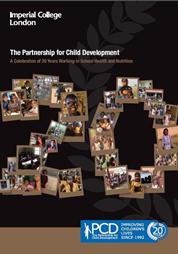In celebration of its 20th anniversary this year, the
Partnership for Child Development (PCD) held an event last week gathering UK parliamentarians, CEOs of pharmaceutical companies, and school health and nutrition (SHN) experts to reflect on its successes over the past two decades and to take a glimpse at future directions.
At the event, former President of Ghana and World Food Prize Laureate H.E. John Kufuor addressed attendees
via video link:
"PCD is doing work that is so important I believe, in all communities, and is good for humanity"¦so children are given a chance into adulthood, to be productive in their communities."
The 20th anniversary offers a chance to look at the work of PCD since its conception in the 1990s, a decade where the focus between education and health expanded from child mortality prevention to include the longer term development of the child.

Based in the world class
School of Public Health at
Imperial College London has sharpened PCD’s scientific edge over the past twenty years. Its success has built on rigorous scientific evaluation of the impact of school-based interventions on children’s health, nutrition, and education.
PCD’s portfolio has also expandedin morerecentyearsto work in partnership with country governments to see the successful implementation of SHN programme interventions. This work focuses on: policy development, programme design and evaluation, and technical supportforgovernment-led national programmes. PCD currently works in partnership with 50 countries in sub-Saharan Africa, South Asia, Southeast Asia, theMiddle East, Latin America and the Caribbean.
During his speech at theanniversary celebrations, H.E. Kufuor highlighted the importance of providing freeschool meals sourced from local farmers, an initiative known as
Home Grown School Feeding (HGSF), which PCD have been supporting insub-Saharan Africa (SSA)since 2010.
Speaking on Ghana'sHGSF programme, which was executed during his presidency he said,"We wanted to create a cycle"¦so we said we should make school feeding home based, to use food stuffs..indigenous to the community but prepared under the guidance of the dieticians, so that nutrition crucial for proper body development would be captured."
HGSF programmes are a win-win for bothsmallholder farmers and children; improving child nutritionandlocal livelihoods at the same time.Since2010,PCD has been at the forefrontin providing tailored programmatic and technical support for HGSF programmes in SSA at the request of country governments which have included:
Ghana,
Kenya,
Ethiopiaand morerecently
Osun State Nigeria.
Over the last year, PCD and
John A Kufuor Foundation have also begun to work together to further build on the leadership capacity of African governments for the initiative.
Twenty years ago, health and nutrition interventions targeted at school-age children were few and far between. Today, they are recognised as global standard practice for the achievement of
Education for All and the world's
Millennium Development Goalson health and education.
Over the past twenty yearsfocusing onthese areas has seen a number of key accomplishments:
In 1993 PCD provided input into the 1st edition of Disease Control Priorities in Developing Countries.
In 1997 PCD published Better Health, Nutrition and Education for the School-Aged Child.
In 2001 PCD and partners developed the Ed-SIDA model which is now routinely used to analyse the global impact of HIV and AIDS on the education system.
In 2002 the Accelerate Initiative was launched by the Working Group of the UNAIDS Inter-Agency Task Team on Education which PCD was a member of.
In 2005 the annual training course, Strengthening Contemporary School Health, Nutrition & HIV Prevention Programmes, was held for the first time by PCD with partner support in Kenya.
In 2008 PCD began supporting research into the concept of self-refractionthrough adjustable spectacles.
In 2011 17 million children ofschool age weretreated for parasitic worms by the Government of Bihar with technical assistance provided from PCD andDeworm the world.
In 2012 the training course, Strengthening Contemporary School Health and Nutrition and HIV Prevention Programmes in Southeast Asia, was held for the first time in Bangkok, Thailand.
In 2012 PCD became a founding member of the LondonCentre for Neglected Tropical Disease Research anda founding member of the UK Coalition against Neglected Tropical Diseases.
Released for its 20th anniversary PCD have put together a documentwhich gives more detail on its SHN interventionsover the past two decades,download
PCD's 20th Anniversary Document.

